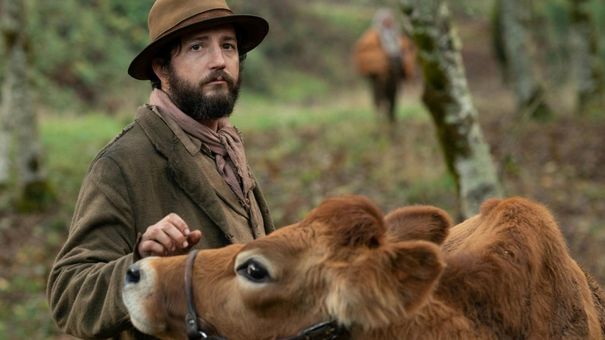Kelly Reichardt’s Secret Ingredient
Steering away from racial stereotypes, First Cow conjures a witty and affecting portrait of an unlikely friendship
By Sadia Khalid

© Allyson Riggs/A24
Present day. A dog digs out what appears to be a human skull in the middle of a thinning forest in broad day light. Its owner scurries to investigate, digging up with her bare hands two whole skeletons lying side by side. A quote from William Blake separate the present from the bygone – “The bird a nest, the spider a web, man friendship.” Cut to a melancholy Pacific Northwest forest in the 1820s populated by fur trappers, cuing the audiences to brace themselves to learn who the bones belonged to, and how they met their fate.
Kelly Reichardt’s Berlinale Competition entry FIRST COW (USA) is an adaptation of the novel “The Half-Life,” by Johnathan Raymond, who co-wrote the screenplay with the director. The film follows an unlikely friendship between a reluctant cook, “Cookie” Figowitz, and a Chinese fugitive, King Lu, in the midst of America’s competitive fur trade – “soft gold,” as it came to be known. A chance encounter leads Cookie to stumble into Lu, naked and trembling in the woods, and the two non-violent strangers instantly connect, sharing a common goal – to survive in a cut-throat world – which transcends cultures and values.
In a realm preoccupied with amassing maximum wealth, the lonely duo set out to make a fortune by selling “Oily Cakes,” which Cookie bakes using the stolen milk of the region’s first and only cow. Ironically, nobody – not even the cow’s owner, Toby Jones’ Chief Factor, a wealthy, snooty English businessman - ever suspects the “secret Chinese ingredient” in the cakes to be milk from his own backyard. Astonished that something so tasty can be found in a place so savage, the chief invites the pair to cook for him at a house party, placing ever-mounting orders that push the limits of the small-time entrepreneurs.
The film, which screened in competition and celebrated its European premiere at the Berlin International Film Festival, refreshingly steers away from racial stereotypes. The Chinese protagonist is not superstitious, nor is the American quirky as most East meets West films would have it. Cookie has no problem trusting Lu, even though his past is shrouded in mystery, and it’s hard to say whether his backstory is completely fabricated.
There are witty social commentaries throughout the film. The cow’s caretaker waits in a long line to buy oily cakes, but the batter finishes before he reaches the front, as if to demonstrate how people with limited means fall short despite their best efforts. Lu is mistaken for a Native American at times, which alludes to how little people knew about other cultures. Even women are scarcely seen in this homogeneous society, where Native Americans only appear as employees to the predominantly white capitalists.
After her 2010 Western “Meek’s Cutoff,” Reichardt continues to reinvent the genre with two highly unorthodox heroes. This slow-paced minimalist film ultimately develops into a metaphor for the American dream reduced to tedious capitalism.

